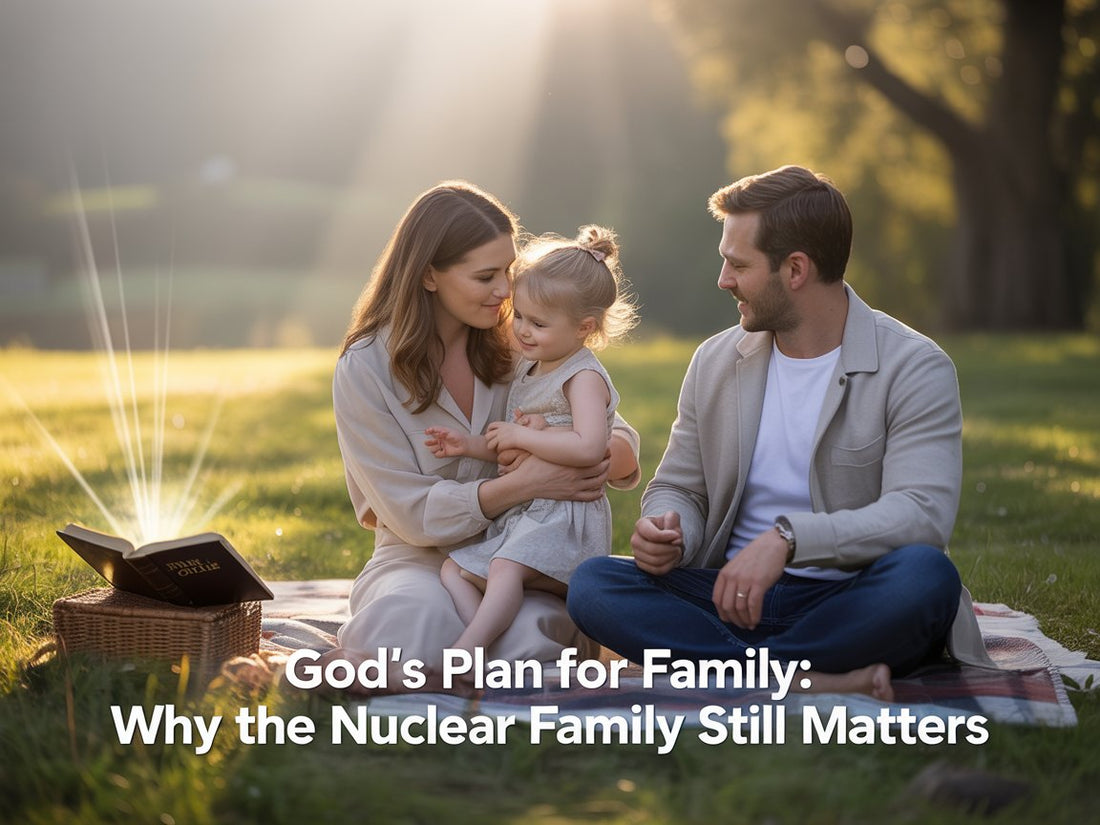When we explore God’s plan for family, we see that it began with a beautiful story in the Garden of Eden. A man and woman were joined together to form a new household, one rooted in unity, purpose, and faith. This foundational design... what we now call the nuclear family... reflects God's heart for stability and spiritual covering.
Not every family follows the traditional model today. Many children are raised in homes touched by divorce, shared custody, or complicated dynamics... and most didn’t choose that for themselves.
This post isn’t here to judge or shame anyone. It’s here to gently clarify what God’s plan for family was designed to be, and why the nuclear family still matters in a world that often dismisses it.
If you're navigating life outside that ideal, know this: you’re not alone, and your role as a parent is still deeply important in God’s eyes.
Table of Contents
God's Plan for Family: His Original Design

“That is why a man leaves his father and mother and is united to his wife, and they become one flesh.” – Genesis 2:24 (NIV)
This verse is more than just about marriage. It marks the beginning of a new family... one where the parents are the spiritual and emotional leaders of their children. According to God’s plan for family, the nuclear unit was intended to be the primary environment for teaching faith, security, and love.
We must first recognize that not every family is able to follow this structure, and many parents today are navigating situations like divorce, grief, coparenting and shared custody.
This post is not here to pass judgment. Its purpose is to meet people where they are at while acknowledging God’s plan for family so we can honor it in the ways we’re able, and provide our children with peace and consistency in the process.
What Happens When the Nuclear Family Is Dismissed
When the biblical model of family is overlooked, children often experience emotional and spiritual fallout. In God’s plan for family, parents are meant to lead with clarity, not be replaced by confusion, competition, or silence.
Children in this position may silently wonder:
- “Why don’t my parents live together?”
- “Why isn’t there a picture of Mom (or Dad) in this house?”
- “Who is in charge?”
These unspoken questions reflect what happens when God’s plan for family is disrupted. One very real example is during school events... when parents sit on opposite sides of the room without speaking, children often feel like they must choose loyalty, even when no one says it aloud. This emotional divide causes stress, guilt, and confusion that can last for years.
Even when parents didn’t choose this situation, nor did the children, acknowledging the loss helps us rebuild with gentleness. Reaffirming God’s plan for family helps restore what’s been shaken and provides kids with an emotional anchor.
Extended Family vs. Nuclear Family in Scripture
In biblical times, extended family played an important role in community life. But Scripture clearly defines God’s plan for family as the formation of a new household:
“That is why a man leaves his father and mother…” – Genesis 2:24 (NIV)
The nuclear family... two parents and their children... was not meant to be governed by grandparents or relatives. While extended family is a blessing, God’s plan for family places the leadership responsibility in the hands of the parents. This is echoed again in Deuteronomy:
“These commandments that I give you today are to be on your hearts. Impress them on your children…” – Deuteronomy 6:6–7 (NIV)
When extended relatives take over parenting decisions or consistently override, undermine, or erase one parent, it damages the child’s sense of order. The undermined parent may withdraw to avoid conflict, slowly losing confidence and their God-given voice. This creates even more confusion for the child, who needs clear leadership and loving authority.
In God’s plan for family, the parents He entrusted with that child were chosen for a reason. Even if the relationship didn’t last, the calling still does.
How to Protect the Heart of the Family
Even if your household doesn’t reflect the ideal nuclear family, you can still walk in God’s plan for family. Here are ways to protect your home’s emotional and spiritual core:
1. Set Loving but Clear Boundaries
Healthy boundaries preserve peace. It’s okay to limit interference from extended family when it disrupts your ability to lead as a parent or parents.
2. Affirm Your Role as a Parent
God’s plan for family gives parents the authority to guide, love, and protect their children. Your voice matters... even if others minimize it.
3. Create Moments of Wholeness
Use the time you have intentionally. Shared prayers, devotions, or routines give your child emotional stability even if their physical environment changes.
4. Parent in Truth, Not Fear
You don’t have to wait for extended family or your child’s other parent to change. You can model truth, love, and strength right now.
5. Reassure Your Child
Remind your child often: “You don’t have to choose sides. You’re allowed to love both of us.” That simple truth brings comfort and clarity.
A Prayer to Protect the Family
Lord, thank You for Your design. Help me protect the heart of my family, even in broken places. Remind me that You chose me to love and lead this child. Give me peace where there’s tension and wisdom when I feel small. Heal what I cannot fix. And let Your voice be louder than every other. Amen.
Frequently Asked Questions
What is the nuclear family in the Bible?
The nuclear family includes two parents and their children living together as one unit. It reflects God’s plan for family as seen in Genesis 2:24.
Why is the nuclear family important in Christianity?
It provides children with stability, identity, and spiritual leadership. God’s plan for family is built on this structure of unity and love.
Is the nuclear family still dominant today?
While not always culturally dominant, the nuclear family is still foundational in Scripture and remains at the heart of God’s plan for family.
What is the difference between a nuclear family and a traditional family?
A nuclear family refers to two parents and their children. A traditional family may include grandparents or relatives. God’s plan for family prioritizes parents as the main leaders of the home.
What does it mean to belong to a nuclear family?
It means you’re part of a home where parents lead with love, faith, and unity. This structure reflects the heart of God’s plan for family.
Are grandparents and other relatives part of the nuclear family?
No. Extended family is a blessing, but the nuclear family... parents and children... is the structure set apart in God’s plan for family.
Can God still work in blended or broken families?
Absolutely. God’s mercy makes room for healing and hope. Even in brokenness, God’s plan for family can be honored and restored.
Key Takeaways
- God’s plan for family begins with the nuclear family: a mother, father, and their children.
- Extended family can be helpful, but should never override the leadership of the parents.
- Children need clarity, love, and spiritual direction from their parents.
- Even if the family structure is broken, God still honors the role of the parent.
- You can walk in God’s plan for family by setting boundaries, leading with love, and trusting His grace to fill the gaps.
Looking for simple ways to build spiritual connection with your child? Be sure to read Jesus and Coffee Mornings with Your Children—a gentle guide to starting the day with faith, love, and presence.
Share Your Thoughts
Has your view of God’s plan for family changed over time? Do you have a story or encouragement for other moms or families walking through transitions?
We’d love to hear from you... feel free to leave a comment or send us a message using the contact form.
You May Also Love
Scripture quotations taken from the Holy Bible, New International Version®, NIV®. Copyright © 1973, 1978, 1984, 2011 by Biblica, Inc.™ Used by permission. All rights reserved worldwide.









